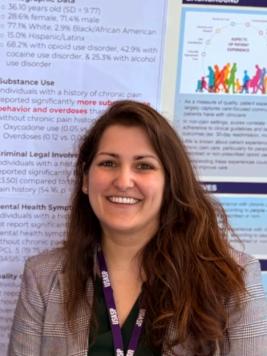2023 Class of HEAL K12 Scholars

Jessica Ma, MD
Assistant Professor of Medicine
Institution:
Duke University
Home Mentor:
Hayden Bosworth, PhD
Pain Management Decision Making in Advanced Kidney Disease
Jessica Ma, MD is a palliative medicine and internal medicine physician and health services researcher. She is a Medical Instructor in the Division of General Internal Medicine at Duke University School of Medicine. She is also a staff physician in the Durham VA Health System, where she sees patients on the inpatient palliative care consult service, inpatient hospice unit, and outpatient palliative care clinic. She completed her internal medicine residency at Washington University in St Louis in 2017. After her internal medicine residency, she was a VA Chief Resident in Quality and Safety at the St Louis John Cochran VA. She then completed her fellowship in hospice and palliative care at Duke University in 2019 and health services research and development at the Durham VA in 2021. She is also the Past Chair of the Early Investigators Forum in the American Academy of Hospice and Palliative Medicine. Her research focuses on improving symptom management for patients with serious illnesses through clinician behavior change, specifically focusing on clinician and patient pain management decision making in advanced chronic kidney disease.

Lakeya McGill, PhD
Assistant Professor of Medicine
Institution:
University of Pittsburgh
Home Mentor:
Leslie Hausmann, PhD
Research Interests: Health Equity, Pain Disparities, Sickle Cell Disease, Social Determinants of Health, Psychosocial, Behavioral & Multilevel Interventions
Dr. Lakeya McGill is an Assistant Professor of Medicine at the University of Pittsburgh and a licensed clinical-community psychologist with expertise in rehabilitation and pain psychology. Her long-term career goal is to transform pain care for adults with sickle cell disease by developing, testing, and implementing effective psychosocial and multi-level interventions. Her K12 project examines how intersectional stigma affects pain outcomes in adults with sickle cell disease. This work identifies risk and protective factors across multiple levels of influence, laying the groundwork for interventions that advance equitable, high-quality pain care.

Bridget Mueller, MD, PhD
Assistant Professor-Research Director
Institution:
Icahn School of Medicine at Mount Sinai
Home Mentor:
Jessica Robinson-Papp, MD, MS
STress REsponse Systems in Fatigue and Migraine Chronification (STREAM)
Dr. Bridget Mueller, MD, PHD is the Research Director of the David S. and Ruth L. Gottesman Center for Headache Treatment and Translational Research at the Icahn School of Medicine at Mount Sinai (ISMMS) and an Assistant Professor of Neurology. Dr. Mueller received a Bachelor of Science from Brown University and a PhD in Neuroscience from the University of Pennsylvania where her research focused on neurodevelopment and the hypothalamic-pituitary-adrenal (HPA) axis. Dr. Mueller completed a postdoctoral research fellowship at Columbia University Medical Center where she studied how juvenile exposure to a high fat diet altered hypothalamic neural circuitry. Dr. Mueller has clinical practices at ISMMS’s David S. and Ruth L. Gottesman Center for Headache Treatment and Translational Research, and the ISMMS Autonomic Function Laboratory. In 2023, Dr. Mueller received a K12 award to examine how phenotyping stress-responsive systems may be used to develop precision medicine approaches for migraine.
2024 Class of HEAL K12 Scholars

Abigail Helm, MS, PhD
Assistant Professor
Institution:
University of Massachusetts Chan Medical School
Home Mentor:
David Smelson, PsyD
Response Inhibition in Opioid Use Disorder, Depression, and Chronic Pain
Dr. Abigail Helm is an Assistant Professor in the Division of Health Systems Science and Department of Medicine at the University of Massachusetts Chan Medical School. Dr. Helm’s background is in neuroscience, cognitive psychology, and developmental psychology, with over 10 years of research experience across a variety of small-scale experimental studies and large randomized controlled trials. Dr. Helm’s current work on multiple federally funded (NIMH, CDC, VA) randomized controlled trials examines evidence-based interventions to treat co-occurring mental health and substance use disorders. Dr. Helm’s specific areas of interest are: (1) assessing impacts of chronic pain and co-occurring addiction and mental health disorders on cognition and (2) adapting multimodal interventions to treat chronic pain and co-occurring disorders.

Ryan Pontiff, PT, DPT, PhD, OCS, FAAOMPT
Assistant Professor of Instruction and Director of Clinical Education for the Hybrid DPT Program
Institution:
University of Texas Medical Branch School of Professions
Home Mentor:
Carole Tucker, PT, PhD
Research Interests: Prevalence of burnout in physical therapists, Interventions for burnout, Orthopedic rehabilitation protocols post-surgery and injury, Muscle recruitment and activation post-surgery and injury
Dr Ryan Pontiff is an Assistant Professor of Instruction at the University of Texas Medical Branch, where he educates physical therapy students and directs clinical education for the Hybrid Program. He holds a Doctor of Physical Therapy and PhD focusing on stress and burnout in physical therapy clinical instructors from Texas Woman's University, along with board certification in orthopedic physical therapy and Fellowship status with the American Academy of Orthopedic Manual Physical Therapists. His research centers on mental health among physical therapists, burnout, chronic pain, and orthopedic injuries. His K12 project focuses on dry needling effects on chronic low back pain and gaining expertise in clinical trial methodology and interventional procedures.

Mark Vorensky, PT, DPT
Assistant Professor
Institution:
Rutgers University
Home Mentor:
Gerard Fluet, PT, PhD, DPT and Pamela Rothpletz-Puglia, EdD, RD
Research Interests: Health equity, patient-clinician relationships, chronic musculoskeletal pain, connections between physical and psychosocial elements of patient care.
Dr. Vorensky is an Assistant Professor in the Department of Rehabilitation and Movement Sciences at Rutgers University. Dr. Vorensky completed his Doctor of Physical Therapy from Ithaca College in 2015 and his PhD in Rehabilitation Sciences from New York University in 2023. His dissertation research investigated the effects of patient-clinician relationships on pain and function among individuals with chronic low back pain. Dr. Vorensky's current research aims to examine how contextual factors, such as a clinicians' workload and autonomy, predict patient-clinician interactions and plan of care decision-making.

Ryan Wexler, ND, MSCR
Assistant Professor
Institution:
National University of Natural Medicine
Home Mentor:
Ryan Bradley, ND, MPH
A Multicomponent Intervention for Patients with Lumbar Radiculopathy: Move-MORE
Ryan Wexler, ND, MSCR, is a naturopathic physician-scientist and Assistant Professor at the Helfgott Research Institute at the National University of Natural Medicine. His research focuses on developing and evaluating multicomponent, mind-body interventions for patients with chronic pain, with particular emphasis on conditions involving nociplastic pain and central sensitization, such as chronic back pain and lumbosacral radiculopathy. Dr. Wexler uses mixed methods to examine how mind-body interventions affect physical function and psychosocial outcomes – including motivation, autonomy, and self-efficacy. His work also utilizes objective assessments including inertial measurement units, quantitative sensory testing, and actigraphy. He is particularly interested in the potential of digital health tools to increase accessibility and scalability of mind-body therapies. His planned projects involve web-based interventions to support behavior change and improve recovery in patients with musculoskeletal pain. His research centers community and patient engagement by integrating stakeholder feedback throughout the research process from intervention development to dissemination.
2025 Class of HEAL K12 Scholars

Mohamad Bittar, MD, MS
Assistant Professor
Institution:
Oregon Health & Science University
Home Mentor:
Jennifer Barton, MD, MCR
Unraveling Chronic Pain and Its Neural Mechanisms in Axial Spondyloarthritis
Dr. Mohamad Bittar earned his medical degree from the American University of Beirut. He completed his internal medicine residency at Indiana University School of Medicine and Rheumatology fellowship at Baylor College of Medicine. He also earned a Master of Science in epidemiology with a focus on clinical investigation from the University of Tennessee Health Science Center. Mohamad has a special interest in axial spondyloarthritis and ankylosing spondylitis. He directs the axial spondyloarthritis clinic at Oregon Health & Science University in Portland. He is the chair of the Education committee and member of the board of directors of SPARTAN (spondyloarthritis research and treatment network). He is currently focused on studying the pain mechanisms in axial spondyloarthritis.

Jan Mooney, PhD
Research Fellow
Institution:
Emory University
Home Mentor:
Sil Soumitri, PhD, ABPP
Impact of Pain Prescribing Guidelines on Outpatient Pain Management for Youth with Sickle Cell Disease and Chronic Pain
Jan T. Mooney, PhD (she/her) is an early-career psychologist in the Aflac Cancer and Blood Disorders Center at Children’s Healthcare of Atlanta and Emory University School of Medicine specializing in pain management for youth with sickle cell disease. She received her doctorate in Health Psychology at the University of North Carolina at Charlotte, and completed her internship in clinical health psychology at Henry Ford Health in Detroit, Michigan. Dr. Mooney is experienced in providing integrative, non-pharmacological treatment approaches to youth with acute, recurrent, and chronic pain. Broadly, she is interested in understanding pain as a complex body experience, as well as how this experience may be influenced by cognitive orientation to it (e.g., acceptance, avoidance) and by larger systems and structures (e.g., racism, sexism, healthcare, law/policy).

Scott Ravyts, PhD
Assistant Professor
Institution:
University of North Carolina at Charlotte
Home Mentor:
Jeanette Bennett, PhD
The Influence of Stress Exposure and Adverse Life Events on Pain Perception and Clinical Outcomes
Scott Ravyts, PhD is a licensed psychologist and an assistant professor in the Department of Psychological Science at the University of North Carolina at Charlotte. He completed his doctorate in clinical psychology at Virginia Commonwealth University followed by a research and clinical fellowship in pain psychology at Johns Hopkins University. His research examines how exposure to stress and adverse life events increases vulnerability to chronic pain and contributes to worse pain outcomes, with a particular emphasis on uncovering the biopsychosocial mechanisms that link adversity to pain.

Antoinette Spector, PT, DPT, PhD
Assistant Professor
Institution:
Northwestern University
Home Mentor:
Rosalind Ramsey-Goldman, MD
Evaluating the feasibility and acceptability of a tailored, online self-management intervention to address pain interference among patients with systemic lupus erythematosus (SLE)
Dr. Antoinette Spector is an assistant professor in the Department of Physical Therapy and Human Movement Sciences in the Northwestern University Feinberg School of Medicine (NU-FSM) and serves as the director of the NU-FSM Doctor of Physical Therapy/Master of Public Health dual degree program. She is trained as an orthopedic physical therapist and spent 10 years in clinical practice before earning a PhD in Public and Community Health from the Medical College of Wisconsin. Dr. Spector’s research program centers on elucidating and addressing the social determinants of pain. Her current research focuses on developing effective and equitable pain management interventions for adults at increased risk of developing high-impact chronic pain, including adults living with systemic lupus erythematosus (SLE). Dr. Spector’s K12 project specifically aims to evaluate the feasibility and acceptability of a virtual self-management intervention that incorporates health coaching and physical activity monitoring to address pain interference among adults living with SLE.

